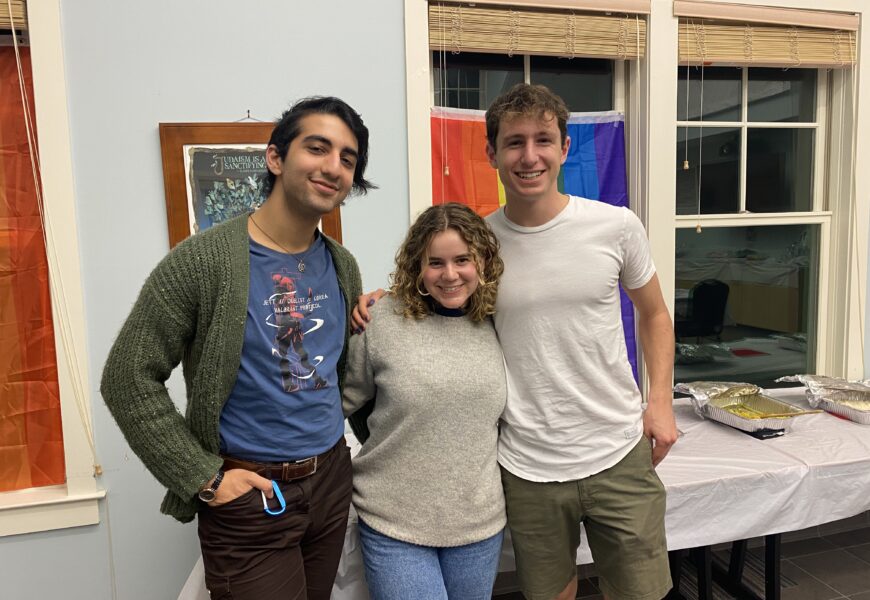On Friday, Feb. 10 at 5:45 p.m., a group of around 50 enthusiastic students gathered in Zachs Hillel House. Ready to share in deep conversations and in a home-cooked dinner, the students walked down to the basement to kick off the event they came for, Connecticut College Hillel House and Gender and Sexuality Program’s Annual Pride Shabbat.
To launch the night, students circled up as event planners Ilan Listgarten ‘25, Amelia Greenwald ‘25, and Sitara Takyar ‘25 spoke about a few guidelines for the affair. They shared that attendees were there to engage with people they might not be used to talking to, hold a safe space with respect on campus, and take a break from everything that was happening on campus in light of the disregard for marginalized communities.
The students then split off into small groups to delve into thoughtful conversions based on seven different discussion questions. They were given questions such as: “How can someone be an ally to a community you’re part of?” “What do you think of recent events relating to DIEI on campus and the subsequent student action?” “How has the culture where you were brought up differ from that of Conn?” and “What do you believe people misperceive about your community?” The students shared intimately about identity, labels, unity, respect, independence, feeling safe, and countless other topics, listening and learning from one another.
After their conversations, the assembly of students moved upstairs to enjoy their home-cooked meal. Director of Zachs Hillel House and Rabbi, Susan Schein, gave an introduction before the regular Friday-night service. Then, the Board members of Hillel led Shabbat prayers as they would at any other Shabbat. Finally, attendees and planners alike shared an Ethiopian meal of doro wat, tofu, cabbage, rice, and salad.
Andrew Kupovich ‘26 attended the event and shared a few thoughts on the experience.
“This is a really cool event and it’s been really enjoyable,” Kupovich says. “I felt like I should attend this event because I am both Jewish and gay. It was really cool to have conversations, especially in light of what is going on on campus right now, about what allyship looks like, about what community looks like, and about what unity on this campus looks like. [These conversations were exciting], especially with seniors and some older people who have seen this campus change over the course of four years and through COVID-19. Hearing their perspectives on what’s going on now too was a really cool experience. It adds an element of perspective to what Shabbat is normally like.”
Many students shared similar sentiments. The importance of an event on campus to celebrate and bring together two intersecting, marginalized communities on campus does not go unspoken. In light of recent events relating to DIEI on campus, a safe space for these groups to gather, exist together, and have meaningful conversations about their identities was essential.
GSP Lead Fellow and event planner Takyar voiced their feelings about the event as well.
“I think it’s important always to acknowledge the intersections that we exist at that we are always affected by,” Takyar said. “Religion & spirituality and queerness tend to have a lot of intersection points whether in a positive way or in a negative way. I think, even in my conversation just now with Rabbi Susan, there’s just something very beautifully communal about this space that in some ways it feels like a found family. People were describing this as a family dinner. It feels like the same structure that in queer community we find and we create. So, for me, it has been beautiful as a purveyor of this event to be able to step into these shoes, to say “Shabbat Shalom,” and to be able to understand people around me a little bit more. To be able to sit next to someone whose beliefs might vary, although we might connect on various, strange axis points, but we understand each other, at least a little bit, because we are in this space together.”
Pride Shabbat has been an annual tradition since 2018. Hillel hosts other similar events year-round that emulate the community and togetherness of this event, but in a different way. Unity Shabbat, sponsored by Hillel and Race and Ethnicity Programs, as well as Multifaith Shabbat, sponsored by Hillel and Religious and Spiritual Programs, are both collaborative events like Pride Shabbat for students to share in their intersecting identities.
Rabbi Susan Schein has enjoyed Pride Shabbat each year it has been held and spoke about its history and importance.
“[Behind the event there was] the idea that there were all these different communities that didn’t know each other,” Schein says. “So, we wanted to start reaching out and Pride Shabbat just seemed obvious for several reasons. One reason is because there are people who are Jewish who would benefit from meeting queer people. Another reason is that there are people who are queer who would benefit from feeling welcome in a religious setting even if they are not Jewish. Oftentimes, and at least in the past, religions did not welcome queer people. So, to let people know that there is a welcoming space, even if it’s not the tradition that they grew up in or the faith that they have, that they don’t have to be outsiders. The third reason is that there are Jews who are queer. I think people here feel welcome, whether they know or not that I am a lesbian. Hillel strives to be open and pluralistic. For students who are queer and who are Jewish, they don’t always necessarily think that those identities overlap, but here they do.”
Pride Shabbat was a rousing success that got the ball rolling on open conversations. It celebrated intersecting identities and gave students a safe haven for the night. It allowed students to rest and recharge by taking a break from the chaos on campus and connecting with those around them in a shared space. •










